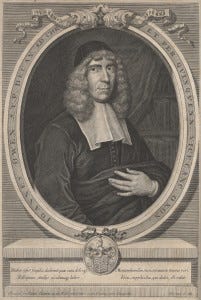John Owen: Why We Need a Robust Theology of the Holy Spirit

Some people refer to the Holy Spirit as the “neglected” member of the Trinity. Certainly, all three persons in the Godhead have been given short shrift at different times and among different groups in the church. But in their history, Protestants can find many who explored the nature and work of the Spirit, though perhaps none more thoroughly than the seventeenth-century Reformed theologian John Owen (1616–1683).
In his later years, Owen penned several treatises beginning in 1674 that were later drawn together in one volume under the title Pneumatologia, or Pneumatology. Some have called this book the best work on the Holy Spirit in the history of the church.
In this substantial volume, Owen presents several arguments for why the doctrine of the Spirit deserves our close examination. To give a taste of Owen’s motivation for explicating the doctrine of the Spirit, I am here quoting (in abbreviated form) the five points under his first reason, “That the doctrine of the Spirit of God, his work and grace, is the second great head or principle of those gospel truths wherein the glory of God and the good of the souls of men are most eminently concerned”—the first being the giving of the Son and the second, the giving of the Spirit. Under this broad reason, Owen listed the following five arguments:[1]
It is of great moment, and sufficient of itself to maintain the cause as proposed, that when our Lord Jesus Christ was to leave the world, he promised to send his Holy Spirit unto his disciples to supply his absence. . . . And this one consideration is sufficient to evince the importance of the doctrine and things which concern the Holy Spirit; for is it possible that any Christian should be so supinely negligent and careless, so unconcerned in the things whereon his present comforts and future happiness do absolutely depend, as not to think it his duty to inquire with the greatest care and diligence into what our Lord Jesus Christ hath left unto us, to supply his absence, and at length to bring us unto himself? He by whom these things are despised hath neither part nor lot in Christ himself. . . .
The great work of the Holy Ghost in the dispensation and ministration of the gospel, unto all the ends of it, is another evidence unto the same purpose. . . . Take away the Spirit from the gospel and you render it a dead letter, and leave the New Testament of no more use unto Christians than the Old Testament is of unto the Jews. . . .
There is not any spiritual or saving good from first to last communicated unto us, or that we are from and by the grace of God made partakers of, but it is revealed to us and bestowed on us by the Holy Ghost. He who hath not an immediate and especial work of the Spirit of God upon him and toward him did never receive any especial love, grace, or mercy, from God. . . .
There is not any thing done in us or by us that is holy and acceptable unto God, but it is an effect of the Holy Spirit; it is of his operation in us and by us. Without him we can do nothing. . . . By him we are regenerated; by him we are sanctified; by him we are cleansed; by him are we assisted in and unto every good work. . . . And it is our unquestionable concernment to inquire into the cause and spring of all that is good in us. . . .
God lets us know that the only peculiarly remediless sin and way of sinning under the gospel is to sin in an especial manner against the Holy Ghost. . . . We cannot use too much holy diligence in our inquiries after what God hath revealed in his word concerning his Spirit and his work, seeing there may be so fatal a miscarriage in an opposition unto him as the nature of man is incapable of in any other instance.
Owen discussed other reasons for understanding the person and work of the Holy Spirit, but this initial argument shows how, in Owen’s mind, a robust theology of the Holy Spirit is central to the whole program of Christian theology, not to mention Christian experience itself.
[1] John Owen, Pneumatologia, vol. 3 of The Works of John Owen, ed. William H. Goold (1850–1853; repr., Edinburgh: Banner of Truth, 1965), 23–29. Italics original.


